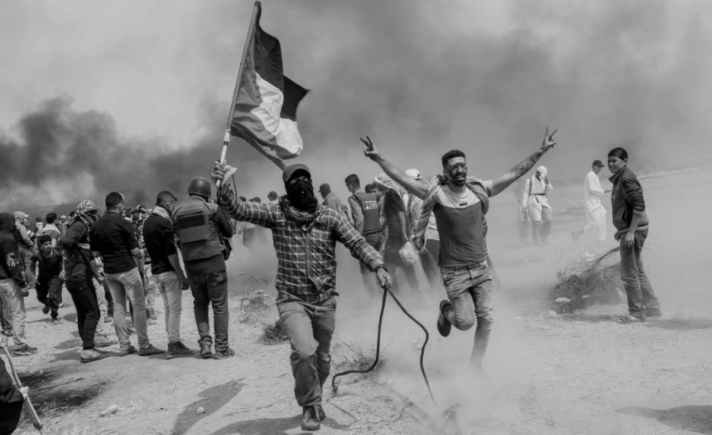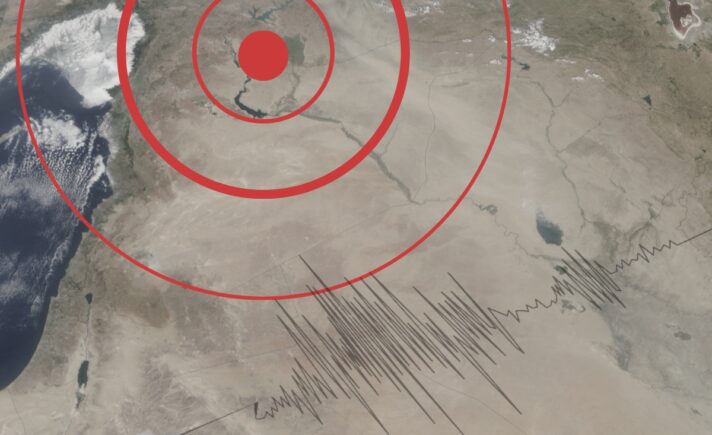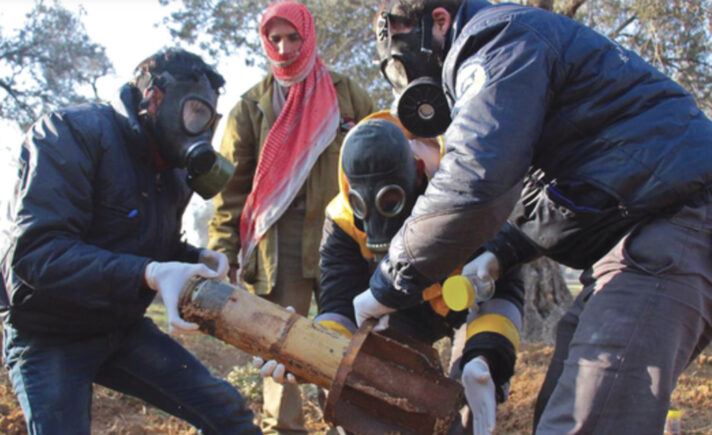This article seeks to expand the definition of civil society to include all individuals and groups that operate outside of oppressive state structures, be they social, political, or economic. It considers civil society to consist of those entities whose activities seek to achieve comprehensive justice or to mitigate the suffering caused by oppressive structures, and who may operate on a range of levels from the individual to the family, or within a given neighborhood, social group, or association. This definition, as I will explain further, also includes revolutions and political resistance movements, as well as individual initiatives that, in one way or another, propel the struggle against injustice and oppression. To this end, I will employ concepts from anarchist theory which view the power to enact change as not restricted to those with high positions or authority, but rather as something that is distributed across all individuals in different forms. This anarchist method seeks to challenge the existence of non-consensual hierarchies between human beings. Most literature, especially that which is written in the Arabic language, uses the term ‘civil society’ to refer to organized or organizational work. This is typically embodied by institutions and formal or informal groups that exist in a space which is considered somewhat distinct from those of the family, the market, or the state (WEF, 2013). Other definitions of the term include various organizational and institutional forms that exist at the international, national, and local levels, as well as non-institutionalized membership-groups, networks, unions, popular social movements, and other entities (Cooper, 2018). It also includes non-governmental or non-profit organizations; emerging virtual communities; religious, spiritual, and faith-based organizations; parts of the private sector that have missions pertaining to social justice; grassroots movements and cooperatives that may be profit-seeking; youth groups; media outlets such as radio, television, print or digital publications; and academic institutions and research institutes, etc. (WEF, 2013). Despite these comprehensive and seemingly all-encompassing definitions, however, restricting the term ‘civil society’ to the aforementioned entities can be deemed as an exclusionary practice that often overlooks various social segments striving towards justice.
While the umbrella term ‘civil society’ contains an incredibly vast array of actors, it has recently been employed in the Global North to describe workers’ associations, societal organizations, trade unions, and non-governmental institutions (VanDyck, 2017). In Arabic-speaking regions, the term ‘civil society’ has come to be used exclusively to denote non-governmental organizations, be they local, national, international, or transnational. These organizations operate under the auspices of humanitarianism, relief-work, human rights initiatives, and democracy or development networks; and within frameworks meant to provide services that compensate for states’ failure to provide basic life necessities to citizens, such as shelter, health services, or education. They also provide these services to those who are not included under citizenship, such as refugees. In what follows, I will attempt to highlight some of the problematic elementsI will be unable to address all these problematic areas and have instead opted to select a few that are especially relevant to Arabic-speaking contexts. of a narrow usage of the term ‘civil society,’ as practiced by entities that rely on funding for their work, and which marginalizes and hijacks the struggles of broad, socially active groups. I also aim to shed light on contradictions between the work of such institutions and the definition of civil society as actors in pursuit of justice, and to explore the political implications of such problematics in relation to Arabic-speaking countries in general, and to Syria in particular.
Therefore, I am constructing this argument according to grassroots understanding of social and political change that perceives socio-political power as not limited to centers of power or to political, social, or cultural elites. Instead, I consider positive social change to be a holistic societal process that begins at the individual level and extends into the organizational. Thus, I argue that we must consider civil society to be both an extension of various sectors of society and as a participatory social process, as opposed to fixed entities. Through this lens, we can more accurately understand the dimensions and dynamics of civil society insofar as it includes non-institutional and decentralized action. In turn, this allows us to better manage our expectations of funding-reliant non-governmental organizations, be they local, national, international, or transnational, and to be more cognizant of the limitations of such organizations’ impact.
Many intellectuals have agreed that the greater our view of what civil society is, the greater the scope of freedom, liberty, and fairness in relation to the distribution of resources (Havel, 1992; Habermas, 1993). Therefore, if we take this into consideration and work to expand the notion of civil society by seeking to raise awareness among individuals about their power to enact change, we can then create incentives for change at the grassroots-level, which would be a step towards transformative change, at least on the discursive level.
In the mid-20th century, and particularly with the extension of the nation-state into the postcolonial or post-imperial world, French philosopher Michel Foucault emphasized the role of civil society in confronting the state’s monopoly overpower and governance. However, as time progressed, Foucault himself began to critique the sanctity projected onto civil society, pointing out that it is inseparable from state structures and state policies, and could even be considered a center of political power (Provenzano, 2016). In line with the work of H.Y. Bokubar (2016) Foucault’s analysis of civil society and the state attempted to open the discourse to a consideration of subjectivity and individual self-reflection, as leadership tools, as ways of resisting the oppressive state and as components of civil society. As such, civil society ought to be regarded as an analytical tool of resistance and an ongoing societal process, rather than something that occupies a static position and is represented by static entities. Furthermore, we cannot consider an entity to be above oppressive practices simply because it emerged from a group that operates outside of state frameworks. Even if it counters state policies, such entities could be guilty of abuses of power, either at the individual level within or outside of the group, or by operating in collusion with oppressive regimes, as has happened in many instances with groups that claim to be a part of civil society.
Furthermore, we cannot discuss the term ‘civil society’ in the Arabic-speaking world without carefully considering what the term ‘civil’ means in Arabic in various contexts. In Syria, for example, the term is used as a distinction from ‘military’ in some instances, and from ‘political’ in others. In Lebanon, the term is used to describe entities that did not participate in the civil war. In Egypt, it refers to those organizations and groups that oppose military rule. In some other contexts, the word ‘civil’ denotes a distinction from ‘tribal’ or ‘rural’ (Abu-Assab, Nasser-Eddin and Seghaier, 2020).
In Syria, the term developed specifically in the context of development and support for civil society as defined by the donors at the time, who considered these organizations to oppose the Baathist political and military regime. However, the epistemological contradiction in this terminology is evident in that the majority of institutions and groups that were formed in the wake of the 2011 revolution were politicized and political from their inception. However, with the increasing international will to reach a political resolution through negotiations, the International Community became more vested in pushing Syrian civil society organizations to become politically “neutral,” and consequently to push them away from traditional public politics.
These developments must be seen as attempts to undermine and neutralize the ability of civil society to create social change. This process of neutralization was made easy by the fact that the institutions in question are directly dependent on state structures for funding in order to conduct their activities, and their employees are dependent on these institutions being funded for their livelihoods. Among the implications of this neutralization effort were: the exclusion of voices that opposed oppressive state structure, and the exclusion of grassroots participation in social and political change. This process was further facilitated by the monopoly of the space of civil society by non-profit and non-governmental organizations that rely heavily on centralized power. Had these organizations contributed to expanding the notion of civil society to include individual and grassroots action, the concept would not have been as easy to monopolize, nor would the various voices struggling against oppression have been as easy to neutralize and exclude. It is possible for those institutions that are licensed and registered recipients of funding to play a crucial role in social and political change by placing grassroots activities and the most marginalized voices at the center of their work, and by creating more participatory frameworks that lend themselves to subjectivity and individuality. It is important here to specify that what I mean by individuality is the celebration of individual differences that make each of us unique and enable us to have our own social roles and contributions that vary in form but not in value. I do not use this term to refer to an individualism that revolves around aloofness and self-interest and which centers individual greed or desires at the expense of others- an ideology largely tied to Western capitalism.

Society is composed of a network of social relations. The means by which these relations are formed is referred to as social processes. Therefore, society cannot exist without the existence of social processes which take place between individuals and extend to the larger societal level. I would like to offer a few examples here from Syria and Palestine. Various people working in institutions that monopolize the space which is referred to as ‘civil society’ have repeatedly expressed their dissatisfaction with the social impact of their work. Many have reiterated that what motivates them to persist is the occasional impact their work has on the lives of individuals. This realization could be important to remember whenever the political despair that plagues Arabic-speaking regions sets in. It may also be an important reminder of the need to expand the sphere of civil society, and that approaching the concept as an inclusive social process that takes place on all levels is an important tool in our struggle towards justice.
Accordingly, in the context of dictatorial and corrupt regimes, we can consider civil society to be the collection of those groups that work in opposition to the oppressive state and which seek to undermine the state’s hegemonic control of power and violence. In the current moment, however, we find that many institutions that receive funding from state actors whitewash their images, as is the case with so-called civil society in the UAE and Saudi Arabia. In Egypt, the space for so-called civil society is gradually shrinking under Sisi’s military rule, in light of his restriction of individual rights. In Jordan, institutions operate within the limits imposed by the state, and they rarely confront or oppose state authority. In these cases, the monopolization of the concept of civil society by these institutions amounts to an appropriation of the real voices that seek justice and struggle against oppression.
Numerous stories and reports have been circulated on social media about repressive practices taking place within the institutions that monopolize the space of civil society, specifically in Lebanon and Palestine. These reports include incidents of harassment, bullying, other forms of harm and abuse, and their mishandling. On one occasion, the entire board of directors of an organization resigned due to bad management practices, but the organization and its management remained, continuing to receive funding and to practice abusive behaviors. Such incidents indicate that these institutions are not qualified to be considered apart of civil society, as they are unable to provide justice on an individual level and are therefore insincere in relation to their pursuit of social justice. These practices sometimes resemble those of political parties, wherein women’s voices are marginalized, and the space is usually antagonistic, masculinist, and hostile to the presence of women, while at the same time claiming to be committed to principles of justice. Even racist right-wing parties claim that they seek a form of justice, usually a unilateral one that benefits one group at the expense of others; oppressing large segments of society; and acting according to financial and economic interests.
We can conclude from the above examples that many of the institutions that are considered to be part of civil society do not correspond to the meaning or role of civil society as activity that pursues justice. Some are complicit in oppression; others have selfish interests and ambitions; some reproduce injustice and oppression; and others may even be complicit with oppressive state regimes. It may also be important here to recall that, even if such institutions are not themselves complicit in wrongdoing, and if they are sincere in their pursuit of justice, they may be operating within and not outside of the framework of the state in one way or another. For example, in the Palestinian territories occupied since 1984, Zionist colonialism requires Palestinian institutions to register as “Israeli institutions” in order to be able to continue their work in the service of their people. Within this framework, Palestinian institutions are considered “institutions for minorities” that operate under a structure that forces them to inadvertently recognize the legitimacy of their Zionist occupiers. The problem here is not only that these institutions will be considered “Israeli” in the annals of history, but also that through this monopoly of the voices of civil society the individual and anarchic elements of Palestinian resistance are marginalized and written out of history. I do not touch upon the Palestinian example in order to criticize pragmatism, but rather to point out that these institutions have limitations. By monopolizing the space of civil society space and making claims to representation, they reproduce the same oppressive system that they claim to oppose, serving it indirectly and marginalizing the voices of individual Palestinians who are seeking justice through resistance.
The claim to representation is among the most significant of the problematic elements of the institutions that monopolize the field of civil society in the region. It would be more accurate and sincere for these institutions to clarify their limitations and refrain from claims of representation. For the most part, said institutions are not formed through elections, but through social processes and relations that have their own dimensions which vary in each context. Recognizing this would benefit the institutions themselves by making them more transparent and thus gaining the trust of the groups they serve. It would also create an open space for disagreement and the emergence of counter voices in the event that they themselves are unable to overcome obstacles they may encounter. As such, these institutions may truly be able to build social bases at the grassroots level, and to create incubators aimed at expanding the sphere and space of civil society and approaching the concept as a continuous process with no beginning or end.
Last year a case of tragic irony occurred when several Palestinian “civil society” institutions called for a protest. These organizations, some of which are over twenty years old, were unable to gather more than a few dozen protestors. This is because they had not managed to build a social base of support comprised of voluntary individual solidarity at the grassroots level, despite their continuous work over the years. This should make us wonder: what are the mechanisms through which these institutions were operating if they were unable to mobilize the social groups whom they claim to serve, and around whom they build their discourse? Many of these institutions still claim that they have broad popular bases, perhaps invisible or homebound, who only appear in emergencies.
In the Syrian context, it is of vital importance for civil society organizations to assert their political and politicized voices against those who attempt to neutralize them, and to work towards disrupting the false dichotomy that has been created between the “civil” and the “political.” One cannot be separated from the other. The pursuit of justice by civil society is a political matter, just as the dominance of the state is a political issue. It is therefore crucial not to abandon the political nature of civil society. In the seventeenth century, English philosopher John Locke (Locke, 1688) did not divide society at large across a false dichotomy of civil society and political society, but rather considered the two to be a single entity. This perspective may be the most useful for understanding social movements that resist oppression and seek justice in this day and age, as all of our lives are political and politicized, and cannot be separated from the general structures that we occupy. In the confrontation of oppressive regimes, it is therefore extremely important, and necessary, that institutions themselves seek to limit their own monopoly over the space of civil society. Instead they must seek to expand that space by centering the individual at the grassroots level; forgoing false claims of representation of broad social groups; recognizing their limited impact; striving towards the equitable distribution of resources and power as opposed to competing over them; and eliminating repressive practices that occur within these organizations as a pre-requisite for eligibility to be considered apart of civil society, insofar as civil society is a tool of resistance within a comprehensive inclusive social process.
References:
– Nour Abu-Assab, Nof Nasser-Eddin & Roula Seghaier (2020): Activism and the Economy of Victimhood: A Close Look into NGO-ization in Arabic-Speaking Countries, Interventions, DOI: 10.1080/1369801X.2020.1749704.
– Bokubar, H.Y. (2016) Civil Society for Michel Foucault: Between Technologies of Rule and Possibilities of Resistance. In Tabayyun: vol. 5, issue 18. Available at: https://bit.ly/3bl8QCC.
– Cooper, R. (2018). What is Civil Society? How is the term used and what is seen to be its role and value (internationally) in 2018? K4D Helpdesk Report. Brighton, UK: Institute of Development Studies.
– Habermas, J. (1992) ‘Further Reflections of the Public Sphere’ in C. Calhoun (ed.) Habermas and the Public Sphere, Cambridge, Mass.: MIT Press.
– Havel, V. (1993) “How Europe Could Fail’, New York Review of Books. 18 November: 3.
Locke, John (1688), Two Treatises of Government, edited by Peter Laslett (Cambridge: CUP, 1988 [1688]).
– Provenzano, L. 2016. “Foucault on the Aporias of State-Phobia: Michel Foucault’s Collège De France Lectures.” [Blog]. Available at: http://bit.ly/2FnTFev. [Accessed March 1, 2018].
– VanDyck, C., K. (2017). Concept and definition of civil society sustainability. Washington DC: Centre for Strategic and International Studies.
– World Economic Forum (2013). The Future Role of Civil Society. World Economic Forum in collaboration with KPMG International. Retrieved from http://www3.weforum.org/docs/WEF_FutureRoleCivilSociety_Report_2013.pdf





